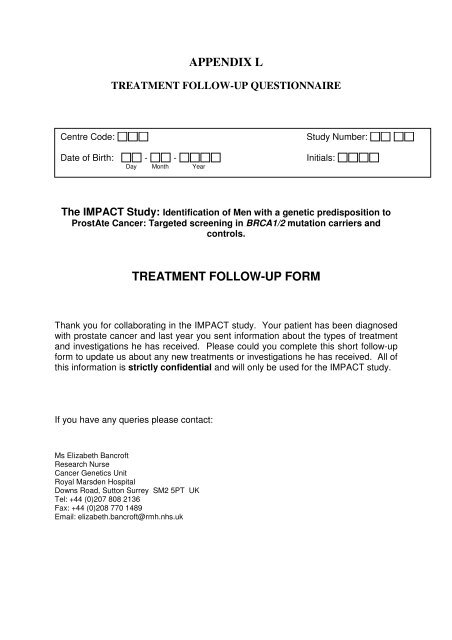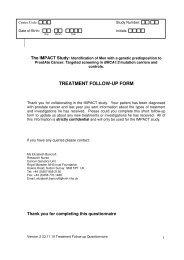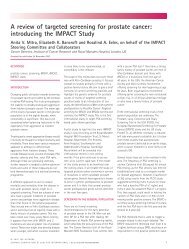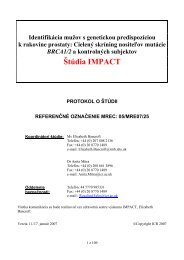APPENDIX L TREATMENT FOLLOW-UP FORM
appendix l treatment follow-up form - IMPACT Study Homepage
appendix l treatment follow-up form - IMPACT Study Homepage
- No tags were found...
You also want an ePaper? Increase the reach of your titles
YUMPU automatically turns print PDFs into web optimized ePapers that Google loves.
<strong>APPENDIX</strong> L<br />
<strong>TREATMENT</strong> <strong>FOLLOW</strong>-<strong>UP</strong> QUESTIONNAIRE<br />
Centre Code:<br />
Study Number:<br />
Date of Birth: - - Initials:<br />
Day Month Year<br />
The IMPACT Study: Identification of Men with a genetic predisposition to<br />
ProstAte Cancer: Targeted screening in BRCA1/2 mutation carriers and<br />
controls.<br />
<strong>TREATMENT</strong> <strong>FOLLOW</strong>-<strong>UP</strong> <strong>FORM</strong><br />
Thank you for collaborating in the IMPACT study. Your patient has been diagnosed<br />
with prostate cancer and last year you sent information about the types of treatment<br />
and investigations he has received. Please could you complete this short follow-up<br />
form to update us about any new treatments or investigations he has received. All of<br />
this information is strictly confidential and will only be used for the IMPACT study.<br />
If you have any queries please contact:<br />
Ms Elizabeth Bancroft<br />
Research Nurse<br />
Cancer Genetics Unit<br />
Royal Marsden Hospital<br />
Downs Road, Sutton Surrey SM2 5PT UK<br />
Tel: +44 (0)207 808 2136<br />
Fax: +44 (0)208 770 1489<br />
Email: elizabeth.bancroft@rmh.nhs.uk
Thank you for completing this questionnaire
Date of Completed Treatment Questionnaire (Data Centre to complete):<br />
- -<br />
Day Month Year<br />
1. Date of last visit: - -<br />
Day Month Year<br />
2. Please record all PSA values since last visit:<br />
Date<br />
PSA value<br />
3. Has the patient had disease recurrence?<br />
No<br />
Yes<br />
If yes, please tick as appropriate:<br />
.<br />
Biochemical Recurrence (PSA only)<br />
Local recurrence<br />
Metastatic disease: Bone Other<br />
Radical Prostatectomy only<br />
Radical Prostatectomy and adjuvant radiation therapy<br />
Prostatectomy and radiotherapy and hormones<br />
Radiotherapy alone<br />
Radiotherapy and adjuvant androgen ablation<br />
Brachytherapy<br />
Cryoablation Therapy<br />
High-Intensity Focused Ultrasonography (HIFU)<br />
Other<br />
4. Please list of any of the following that have occurred in the last year:<br />
< 6 months<br />
> 6 months<br />
Type of Imaging Date of report Result (please enclose copies of<br />
reports*)<br />
CT Scan 1)<br />
2)
MRI 1)<br />
2)<br />
Transrectal Ultrasound 1)<br />
(TRUS) 2)<br />
Bone Scan 1)<br />
2)<br />
IVP 1)<br />
(Intravenous Pyleogram) 2)<br />
Over the past month,<br />
how often have you…<br />
1. …had a sensation of<br />
your bladder<br />
Not at<br />
all<br />
Less than 1<br />
time in 5<br />
Less than<br />
half the<br />
time<br />
About<br />
half the<br />
time<br />
More than<br />
half the<br />
time<br />
0 1 2 3 4 5<br />
Almost<br />
always<br />
Score<br />
Other 1)<br />
2)<br />
* Please remove any patient identifiers from imaging reports and replace with IMPACT study number.<br />
5. Please ask the patient to score the following urinary symptoms:
1. How do you rate your<br />
Very Low Medium High<br />
confidence that you could get<br />
low<br />
completely emptying<br />
and keep an erection?<br />
1 2<br />
3<br />
4<br />
after you finished<br />
urinating?<br />
2. When you had erections No sexual Almost A few times Sometimes Most times<br />
with sexual stimulation, how activity never or (much less (about (much more<br />
2. …had to urinate 0 1 2 3 4 5<br />
often were you erections hard<br />
never than half the half the than half the<br />
again less than two<br />
enough for penetration<br />
time) time) time)<br />
hours after you<br />
(entering your partner)?<br />
0<br />
1 2<br />
3<br />
4<br />
finished urinating?<br />
3. During sexual intercourse, No sexual Almost A few times Sometimes Most times<br />
3. …stopped and 0 1 2 3 4 5<br />
how often were you able to activity never or (much less (about (much more<br />
started again several<br />
maintain your erection after<br />
never than half the half the than half the<br />
times while urinated?<br />
you had penetrated (entered)<br />
time) time) time)<br />
4. …found it difficult 0 1 2 3 4 5<br />
your partner<br />
0<br />
1 2<br />
3<br />
4<br />
to postpone urination?<br />
4. During sexual intercourse, Did not Extreme Very Difficult Slightly<br />
5. …had a weak 0 1 2 3 4 5<br />
how difficult was it to<br />
attempt ly difficult<br />
difficult<br />
urinary stream<br />
maintain your erection to intercourse difficult<br />
6. …had to push or 0 1 2 3 4 5<br />
completion of intercourse?<br />
0<br />
1 2<br />
3<br />
4<br />
strain to begin<br />
5. When you attempted sexual No sexual Almost A few times Sometimes Most times<br />
urination<br />
intercourse, how often was it activity never or (much less (about (much more<br />
None Once Twice 3 times 4 times 5 times<br />
satisfactory for you?<br />
never than half the half the than half the<br />
or more<br />
time) time) time)<br />
7. Over the last month 0 1<br />
0<br />
2<br />
1<br />
3<br />
2<br />
43<br />
5<br />
4<br />
how many times did<br />
SCORE<br />
you typically get up to<br />
urinate from the time<br />
you went to bed at<br />
night until you got up<br />
in the morning?<br />
Very<br />
high<br />
5<br />
Almost<br />
always<br />
or<br />
always<br />
5<br />
Almost<br />
always<br />
or<br />
always<br />
5<br />
Not<br />
difficult<br />
5<br />
Almost<br />
always<br />
or<br />
always<br />
5<br />
Total Score ________<br />
0 – no symptoms<br />
1-7 indicate mild symptoms of an enlarged prostate<br />
8-19 indicates moderate symptoms of an enlarged prostate<br />
20-35 indicates severe symptoms<br />
6. Please ask the patient to score the following questions about sexual function:<br />
Total Score ________<br />
(If the score is 21 or less the patient may be showing signs of erectile dysfunction)<br />
7. Please complete the below:<br />
Assessment for Late Side-Effects after Radiotherapy (Score symptoms over the last 4 weeks)<br />
Please circle appropriate response<br />
URINARY SYMPTOMS (excluding urinary tract infections)<br />
Average daytime frequency Nocturia Incontinence<br />
1. >2 hourly 1. 0-1 times 1. None<br />
2. 2 hourly 2. 2-3 times 2. Occasional incontinence<br />
3. 1-2 hourly (no treatment) 3. 4-5 times 3. Frequent incontinence<br />
4. 1-2 hourly (simple out-patient 4. 6-8 times requiring use of pads<br />
management) 5. >8 times 9. Unknown<br />
5.
RTOG Gradings for late side effects after radiotherapy (Score symptoms over the last 4 weeks)<br />
Please Grade 0-5<br />
Grading System<br />
Grade 0 – no symptoms<br />
Grade 1 – minor symptoms requiring no treatment<br />
Diarrhoea ______ Grade 2 – symptoms responding to simple outpatient management,<br />
lifestyle (performance status not affected)<br />
Proctitis ______ Grade 3 – distressing symptoms altering patient’s lifestyle performance<br />
status). Hospitalisation for diagnosis or minor surgical<br />
Cystitis ______ intervention (such as urethral dilation) may be required<br />
Haematuria ______<br />
Grade 4 – major surgical intervention (such as laparotomy, colostomy,<br />
cystectomy) or prolonged hospitalisation required<br />
Grade 5 – fatal complications<br />
Diarrhoea is defined as a clinical syndrome characterised by frequent loose bowel movements without associated<br />
rectal irriation (tenesmus)<br />
Proctitis is defined as a clinical syndrome characterised by rectal irritation or urgency (tenesmus), presence of musus<br />
or blood in the stool and, in some patients, with frequent, sometimes looses, bowel movements.<br />
Cystitis is difined as a syndrome characterised by irritative bladder symptoms such as frequency and dysuria.<br />
Haematuria may or may not be part of the clinical picture of cystitis.<br />
Please sign and below & enter the date of completion – thank you.<br />
Signed …………………………………………………………….<br />
Date - -<br />
Day Month Year





